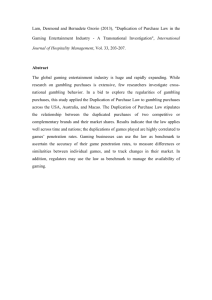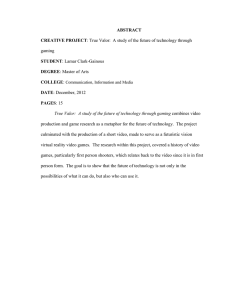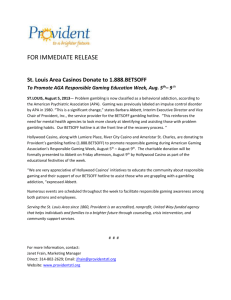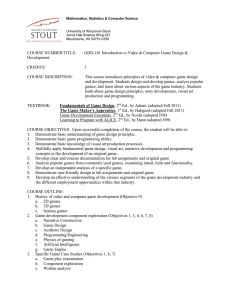related activities drastically negotiating settlement agreements changed DoJ's public position on
advertisement
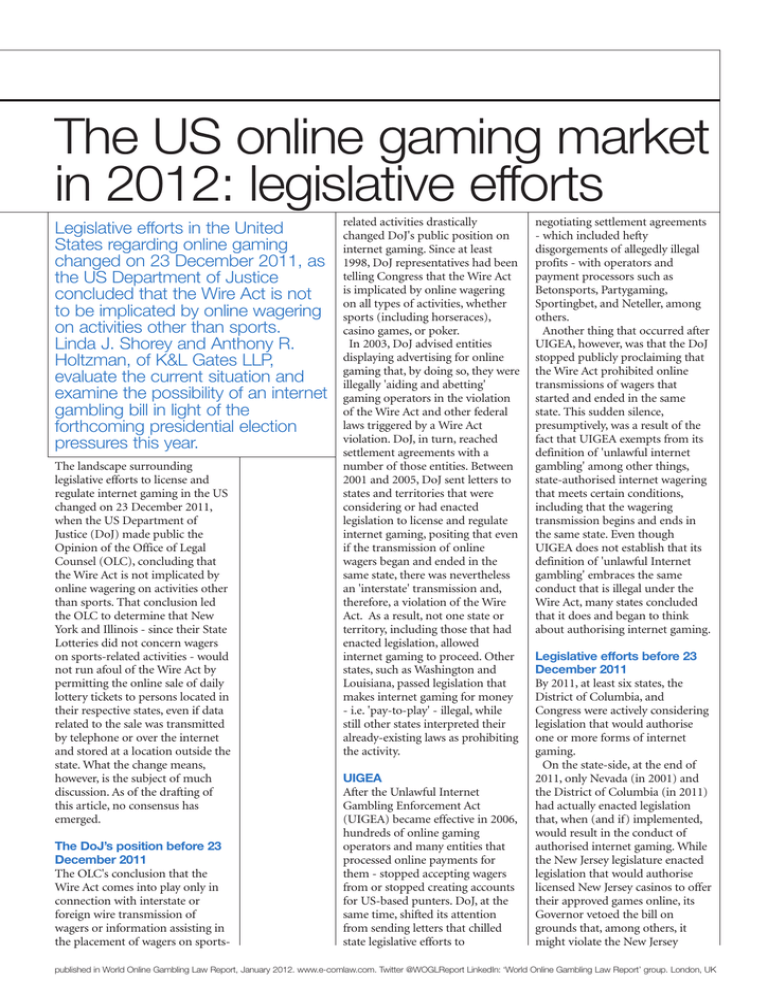
The US online gaming market in 2012: legislative efforts Legislative efforts in the United States regarding online gaming changed on 23 December 2011, as the US Department of Justice concluded that the Wire Act is not to be implicated by online wagering on activities other than sports. Linda J. Shorey and Anthony R. Holtzman, of K&L Gates LLP, evaluate the current situation and examine the possibility of an internet gambling bill in light of the forthcoming presidential election pressures this year. The landscape surrounding legislative efforts to license and regulate internet gaming in the US changed on 23 December 2011, when the US Department of Justice (DoJ) made public the Opinion of the Office of Legal Counsel (OLC), concluding that the Wire Act is not implicated by online wagering on activities other than sports. That conclusion led the OLC to determine that New York and Illinois - since their State Lotteries did not concern wagers on sports-related activities - would not run afoul of the Wire Act by permitting the online sale of daily lottery tickets to persons located in their respective states, even if data related to the sale was transmitted by telephone or over the internet and stored at a location outside the state. What the change means, however, is the subject of much discussion. As of the drafting of this article, no consensus has emerged. The DoJ’s position before 23 December 2011 The OLC's conclusion that the Wire Act comes into play only in connection with interstate or foreign wire transmission of wagers or information assisting in the placement of wagers on sports- related activities drastically changed DoJ's public position on internet gaming. Since at least 1998, DoJ representatives had been telling Congress that the Wire Act is implicated by online wagering on all types of activities, whether sports (including horseraces), casino games, or poker. In 2003, DoJ advised entities displaying advertising for online gaming that, by doing so, they were illegally 'aiding and abetting' gaming operators in the violation of the Wire Act and other federal laws triggered by a Wire Act violation. DoJ, in turn, reached settlement agreements with a number of those entities. Between 2001 and 2005, DoJ sent letters to states and territories that were considering or had enacted legislation to license and regulate internet gaming, positing that even if the transmission of online wagers began and ended in the same state, there was nevertheless an 'interstate' transmission and, therefore, a violation of the Wire Act. As a result, not one state or territory, including those that had enacted legislation, allowed internet gaming to proceed. Other states, such as Washington and Louisiana, passed legislation that makes internet gaming for money - i.e. 'pay-to-play' - illegal, while still other states interpreted their already-existing laws as prohibiting the activity. UIGEA After the Unlawful Internet Gambling Enforcement Act (UIGEA) became effective in 2006, hundreds of online gaming operators and many entities that processed online payments for them - stopped accepting wagers from or stopped creating accounts for US-based punters. DoJ, at the same time, shifted its attention from sending letters that chilled state legislative efforts to negotiating settlement agreements - which included hefty disgorgements of allegedly illegal profits - with operators and payment processors such as Betonsports, Partygaming, Sportingbet, and Neteller, among others. Another thing that occurred after UIGEA, however, was that the DoJ stopped publicly proclaiming that the Wire Act prohibited online transmissions of wagers that started and ended in the same state. This sudden silence, presumptively, was a result of the fact that UIGEA exempts from its definition of 'unlawful internet gambling' among other things, state-authorised internet wagering that meets certain conditions, including that the wagering transmission begins and ends in the same state. Even though UIGEA does not establish that its definition of 'unlawful Internet gambling' embraces the same conduct that is illegal under the Wire Act, many states concluded that it does and began to think about authorising internet gaming. Legislative efforts before 23 December 2011 By 2011, at least six states, the District of Columbia, and Congress were actively considering legislation that would authorise one or more forms of internet gaming. On the state-side, at the end of 2011, only Nevada (in 2001) and the District of Columbia (in 2011) had actually enacted legislation that, when (and if) implemented, would result in the conduct of authorised internet gaming. While the New Jersey legislature enacted legislation that would authorise licensed New Jersey casinos to offer their approved games online, its Governor vetoed the bill on grounds that, among others, it might violate the New Jersey published in World Online Gambling Law Report, January 2012. www.e-comlaw.com. Twitter @WOGLReport LinkedIn: ‘World Online Gambling Law Report’ group. London, UK Constitution. It looked as if New Jersey voters would need to adopt a state constitutional amendment permitting the legislature to authorise internet gaming before its Governor would sign an internet gaming bill. California with two bills pending - deferred consideration until 2012, as it continued to pursue efforts to reach compromise, including finding a position on the regulation of online gaming that would be acceptable to Californiabased Tribes. Two bills were introduced in the U.S. House of Representatives in 2011 - the Campbell/Frank bill which would authorise online wagering on most activities except sports, and the Barton bill - which would authorise only online wagering on poker. There was also a widely-held belief that Senator Harry Reid (D-NV), the Senate Majority Leader, was continuing to attempt to work with Senator John Kyl (R-AZ), a leading opponent of online gaming, to find common ground and craft legislation that would authorise internet poker and strengthen UIGEA. When Congress did not enact legislation before recessing for the holidays, however, most commentators believed it would not move an internet gaming bill until 2013, given the potential political risks of doing so during a presidential election year (2012) and the demand by State Lotteries and Tribes to be heard on the subject. What might happen next? With the announcement of the OLC opinion, the previouslyaccepted, relatively weak prognosis for the enactment of online gaming legislation began to be questioned. An immediate response was an increase in stock prices for some online operators and lottery vendors. This point, however, was countered by the In an election year for state legislators, as it will be in many states, there may be little appetite to move quickly on internet gaming even with the states' continuing need for new revenue reality that the OLC opinion is only binding on the DOJ - not the courts - and does not change any state criminal law or any federal criminal law triggered by a violation of state law. Election year As to the impact on state legislative efforts - some commentators predict states will rush to authorise their State Lotteries to offer games of chance and poker online - with some pundits suggesting that many states will, in turn, enter into compacts allowing their residents to play the same online games at the same time, increasing the size of the prizes. Some suggest that states with land-based commercial and tribal casinos will authorise those entities to make their casino games - slots and table - available online. Others caution that states, with the possible exception of New Jersey, are not likely to rush to take action. Until recently, only a handful of states had key legislators and Governors who were paying attention to internet gaming and, for key officials in other states, there will be a substantial learning curve. And, in many states, even those with a State Lottery or landbased casinos, gambling expansion is likely to be a 'political hot potato.' In an election year for state legislators, as it will be in many states, there may be little appetite to move quickly on internet gaming - even with the states' continuing need for new revenue. forms to be conducted by different entities. Those suggesting Congress will not act in 2012 point primarily to the pressures associated with the typical presidential election year. In short, it is too early in the year to make good predictions of what may actually happen. The possibilities are still being identified and examined. As Congress and State legislatures return to session in 2012, a better sense of the situation should emerge. Linda J. Shorey Partner Anthony R. Holtzman Associate K&L Gates LLP linda.shorey@klgates.com anthony.holtzman@klgates.com Congress There is also a divergence among commentators on whether the OLC opinion will give Congressional leaders a reason to pursue an internet gambling bill. Those suggesting Congress will act in 2012 point, among other things, to the patchwork of legislation that will result if states start authorising internet gambling in differing published in World Online Gambling Law Report, January 2012. www.e-comlaw.com. Twitter @WOGLReport LinkedIn: ‘World Online Gambling Law Report’ group. London, UK


